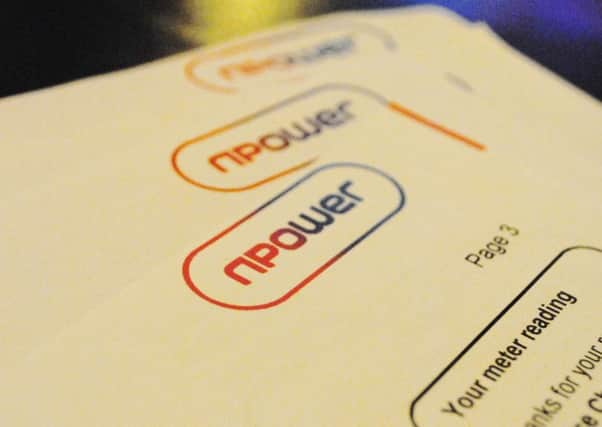Outrage as Npower hikes fuel bills by nearly 10%


The Big Six energy firm said the move, which will affect 1.4 million customers on a standard variable tariff, comes in the face of rising wholesale energy costs and will come into effect on March 16.
Simon Stacey, managing director of npower’s domestic markets, said it was a “hugely difficult decision”.
Advertisement
Hide AdAdvertisement
Hide AdBut energy regulator Ofgem rebuked npower, saying it does not see “any case” for significant price increases where suppliers have bought energy in advance, and demanded the firm justify the decision to its customers.
An Ofgem spokesman said: “Our new supplier cost index shows that costs for energy suppliers have risen over the past year after having fallen for the previous two to three years.
“However, we don’t see any case for significant price increases where suppliers have bought energy well in advance. Npower must therefore justify the decision to its customers.”
Mr Stacey insisted npower “delayed the date this takes effect until after the coldest months of the year” and said that its most vulnerable customers will not be impacted until May.
Advertisement
Hide AdAdvertisement
Hide AdThe Government also weighed in, with Prime Minister Theresa May’s spokesman saying the Government was “concerned” about the move.
“Obviously, we are concerned by npower’s planned increases. The Government is committed to getting the best deal for households.
“Suppliers are protected from the recent fluctuations in the wholesale energy prices in which they are buying up to two years in advance. So we expect energy companies to treat their customers fairly, and are being clear that where markets aren’t working we are prepared to act,” he told a regular Westminster briefing.
Npower’s price hike on typical dual fuel annual energy bills is made up of an average increase of 4.8% on gas and 15% on electricity.
Advertisement
Hide AdAdvertisement
Hide AdThe firm said another 1.4 million fixed rate and pre-payment customers will not be affected by the increase.
“Since npower last raised its prices three years ago, there have been increases in wholesale energy costs and rises in the cost of delivering Government policies, such as smart metering, renewables obligation and the capacity market. This trend is set to continue,” the firm said.
The move comes after rival EDF hiked prices in December.
Experts believe the company’s decision could be a precursor to other energy providers ramping up prices.
It comes at a difficult time for consumers, who will face soaring prices this year after the country voted for Brexit, resulting in the collapse in the value of the pound.
Advertisement
Hide AdAdvertisement
Hide AdInflation rose to a two-and-a-half year high of 1.6% in December, and is expected to rise further over 2017 as the cost of imports soars off the back of the British currency’s fall.
Neil Wilson, senior market analyst at ETX Capital, said: “Npower raising prices by nearly 10% only adds to the fears that inflation - driven by high oil prices and weak sterling - will crimp consumer spending throughout 2017.
“We have to assume that some of the other Big Six energy providers will follow when they review in April.
“It’s a sign that higher input prices - seen across UK industry - are starting to bite.
Advertisement
Hide AdAdvertisement
Hide Ad“Someone has to pay for it and that burden is going to fall on the British consumer. Food and clothing retailers are next in line.”
Sterling has fallen nearly 18% against the US dollar and around 10% against the euro since the Brexit vote.
Labour MP and chairman of the Commons Business, Energy and Industrial Strategy Committee Iain Wright told BBC Radio Four’s World At One: “I think it is unacceptable, and I don’t think npower should have done this.
“They are usually bottom of the league when it comes to customer service, and now they are top of the league when it comes to the biggest price hike in recent years.”